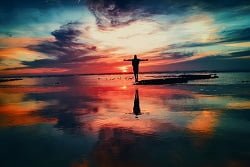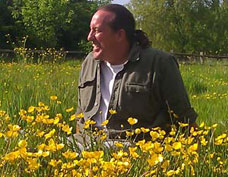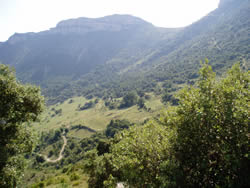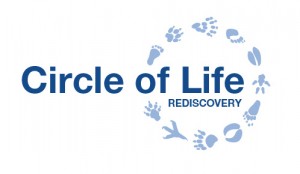Spirituality, mental health, wellbeing
Written by Marina Robb (Director Circle of Life Rediscovery CIC)
Spirituality is the innate aspect of being human. We have a natural capacity to be spiritual. The search for meaning and purpose in life is a central pillar of spirituality.
The UK school curriculum aims to “Promote the spiritual, moral, cultural, mental, physical development of pupils at school and of society.” (Section 351 of the Education Act 1996) Many of us who are practitioners who work with children, young people and adults, approach human development from a holistic perspective, with spiritual development being a key ingredient.
But what do we mean by spirituality?
Giesenberg (2007) defines it: ‘Spirituality is an innate part of a person. It is an awareness or consciousness of the surrounding world, a sense of compassion and love towards this world and anything in it shown through wonder and through activities and relationship with peers and significant adults in the child’s life.’
 For me, it has always been connected to the bigger questions and unknowns of life, as well as the ‘ah ha’ moments and feelings of awe that you get when you experience something special. It has something to do with a ‘consciousness’ or perhaps ‘a group mind’ (like the morphic resonance that Rupert Sheldrake talks about), that permeates all of life.
For me, it has always been connected to the bigger questions and unknowns of life, as well as the ‘ah ha’ moments and feelings of awe that you get when you experience something special. It has something to do with a ‘consciousness’ or perhaps ‘a group mind’ (like the morphic resonance that Rupert Sheldrake talks about), that permeates all of life.
There is understandably a hesitancy when we use the word ‘spirituality’ as it historically has been closely linked to religion and religious experiences. In more modern times, it has been re-framed to allow this ‘feeling’ of connectedness or mystery to be named without the dogma of any religion or tradition. To enable a discussion around this aspect of life, and to be ‘inclusive’ we are attempting to clarify a very real difference between religion and spiritual. However, experience is inevitably personal and emotional.
Adam et al (2008) defines ‘spiritual’ as, ‘the very sense of being connected to others (whether to people, creatures of things)’. It is intangible, goes beyond anything that is visible or tactile and is, in essence spiritual. Eastern and western mystical traditions focus on spirituality as a journey towards unity with other, ultimately a feeling of becoming one with other.

Sal Gencarelle, who I will be co-leading our workshop on ‘Well-being and Spirituality’ on June 11th, describes spirituality as, ‘the science of connection’. (Join us live on a webinar on May 7th 2019). We will explore Spirituality, mental health, wellbeing during our webinar and workshop.
The word ‘spiritual’ comes from the Latin ‘spirare’ meaning ‘to breathe’. Elementally, it is linked to air, which moves through and within all of life, and brings well-being. I am often reminded by children about the essential animistic quality of life. In the early years, the child’s world has no separation between object and subject and everything is alive. This sense of aliveness and connection is foundational to most indigenous world view that see all of life as ‘subjects’ within life. This promotes a harmony with nature, and puts a ‘spiritual’ value on life, where the spiritual and physical are united.
Knowledge in this paradigm comes directly from experience and learning happens from the non-human and human alike. Our ancestral traditions are often written off as ‘primitive’ or ‘spiritual’ yet these people deeply felt the intrinsic ‘aliveness’ of the plant and animal kingdoms – from the trees to the stones. Long-standing earth-based cultures have this awareness and understanding and are experts in their fields. It is understood that although we ‘look different’ and grow and change at a different speed (e.g rocks or trees), we share the same essential materials and are exchanging atoms, molecules and hormones all the time. Humans and their galaxy have about 97 percent of the same kind of atoms elements of life. These are known as the building blocks of life and are the crucial elements: carbon, hydrogen, nitrogen, oxygen, phosphorus and sulphur. We are made of stardust!
Mental Health is defined as:
“The emotional and spiritual resilience which allows us to enjoy life and survive pain, disappointment and sadness. It is a positive sense of well-being and an underlying belief in our own, and others, dignity and worth”. (Mental health Promotion: A quality Framework, Health Education Authority, (1997) London: HEA)
It is really interesting to me that to have ‘mental health’ we need emotional and spiritual resilience – two aspects that are often ‘unconscious’ responses and experiences in life. In way they also are opposite ends of the rational and logical parts of ourselves. Yet we know understand through neuroscience, that we have a ‘system 1’ (emotional, sense-based system) and a ‘system 2’ system (logical, super-intendent) and that to be well, we need to develop in all these aspects.
 My mental health has been challenging several times in my life, sometimes in a big way, and often is small little ways. Defining our ‘wellness’ is often a measure of our ability to move through our pain and discomfort, rather than avoiding it. We can’t avoid pain in our lives, but we can learn to have perspectives and experiences that help us move to wellness.
My mental health has been challenging several times in my life, sometimes in a big way, and often is small little ways. Defining our ‘wellness’ is often a measure of our ability to move through our pain and discomfort, rather than avoiding it. We can’t avoid pain in our lives, but we can learn to have perspectives and experiences that help us move to wellness.
We know that our experiences impact our lives and our ability to form healthy relationships. Our early experiences have a huge affect on our ability to cope with stress and on the development of our emotional and sensory processing systems. Traumatised children struggle to self-regulate across environments and find it difficult to trust and feel safe with adults. These children tend to experience the world through a ‘fear lens’ (Perry 2005).
I recently saw an image of a piece a paper with many dots on it – there was a red line joining dots to form a line across the paper. This was meant to show the story we tell ourselves about our lives. The story gets fixed on key events and we repeat this story until we believe this is who we are, and all that has happened to us. If we take a moment and look beyond the line, we can see hundreds of more dots, all experiences that tell us more about our lives and experiences. Doing this, helped me remember that the story of who I am and what has happened to me, is greater that the one line.
When we drill down under the surface, many of us don’t feel good enough, we lack confidence in what we know and struggle to speak out. We struggle to tell our story, to share our vulnerability – yet it’s in those places that are the treasure and core, unshakeable strength. Some interesting questions to think about:
– What has happened to you? (How is power operating in your life?)
– How did it affect you? (What kind of threats does this pose?)
– What sense did you make of it? (What is the meaning of these situations and experiences to you?)
– What did you have to do to survive? (What kinds of threat response are you using?)
– What are your strengths? (What access to Power resources do you have?)
– What is your story? (How does all this fit together?)
I have worked with vulnerable and challenged young people for most of my working life and my own lived experience of mental health difficulties in my late teens hugely impacted and transformed my life. Nature and healthy relationships were key to my healing and ability to thrive and make healthy choices. My worldview was influenced by different cultures who opened many doors to my understand of ‘reality’ and how nature plays a huge part in a feeling of belonging, place-attached.
Around the world, we know that economic growth alone is not enough to produce happiness. Happiness and well-being is actually reduced despite people in the UK or USA being richer, according to survey day (Global Happiness and Wellbeing Policy Report 2019).
Nature offers us rest-bite and restoration. It is a place of no-judgement and feeling the different non-human relationship that feels safe, once you get out there – sitting round a fire, allow the gentle movement of the flames. It is often mesmerising, uncomplicated and peaceful. In the cultural we inhabit, we present a particular version of ourselves, and in my experience nature allows us our freedom to be and discover ourselves in a new way.
Spirituality, mental health, wellbeing Workshop:
We will be exploring these themes during our webinar on May 7th 2019 (see below), and during our workshop on June the 11th in East Sussex (Spirituality and well-being Workshop).
You are invited to join Marina Robb and Sal Gencarelle on a Zoom Webinar meeting.
When: May 7th, 2019 8:00 PM London
Register in advance for this meeting here.
After registering, you will receive a confirmation email containing information about joining the meeting.
For more about Spirituality, mental health and wellbeing – buy Sal’s new book ‘Thriving in uncertain times’.
 Circle of Life Rediscovery provides exciting and highly beneficial nature-centred learning and therapeutic experiences for young people, adults, and families in Sussex woodlands, along with innovative continuing professional development for the health, well being and teaching professionals who are supporting them.
Circle of Life Rediscovery provides exciting and highly beneficial nature-centred learning and therapeutic experiences for young people, adults, and families in Sussex woodlands, along with innovative continuing professional development for the health, well being and teaching professionals who are supporting them.
Sign up to our newsletter for updates about our courses, CPD’s, well-being & nature based training and events.
